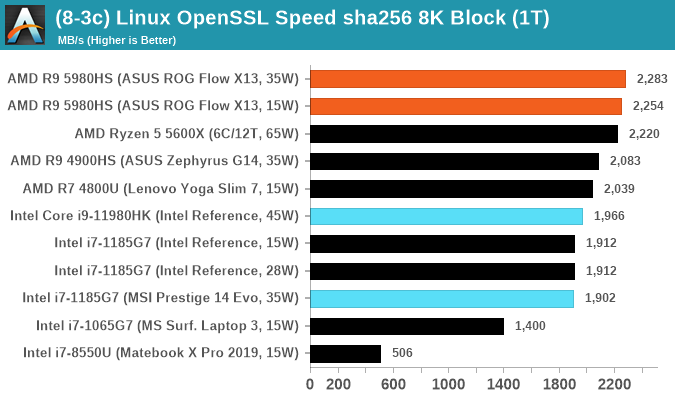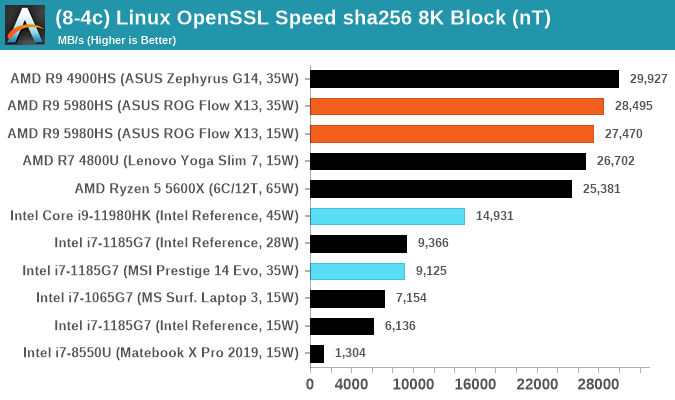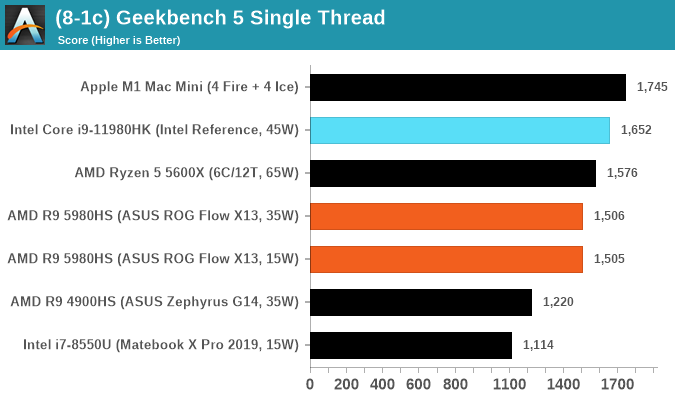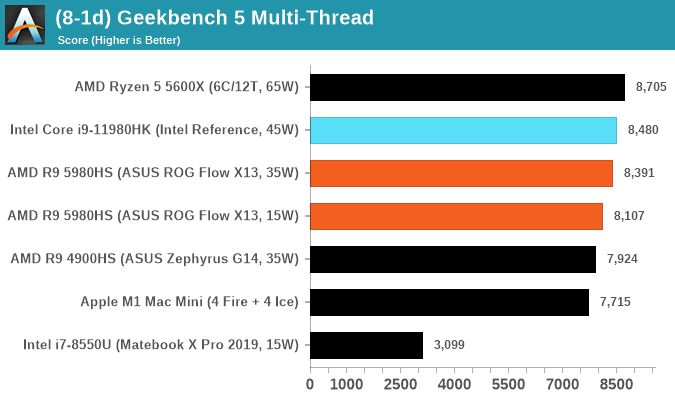Intel 11th Generation Core Tiger Lake-H Performance Review: Fast and Power Hungry
by Brett Howse & Andrei Frumusanu on May 17, 2021 9:00 AM EST- Posted in
- CPUs
- Intel
- 10nm
- Willow Cove
- SuperFin
- 11th Gen
- Tiger Lake-H
CPU Tests: Synthetic
Most of the people in our industry have a love/hate relationship when it comes to synthetic tests. On the one hand, they’re often good for quick summaries of performance and are easy to use, but most of the time the tests aren’t related to any real software. Synthetic tests are often very good at burrowing down to a specific set of instructions and maximizing the performance out of those. Due to requests from a number of our readers, we have the following synthetic tests.
Linux OpenSSL Speed: SHA256
One of our readers reached out in early 2020 and stated that he was interested in looking at OpenSSL hashing rates in Linux. Luckily OpenSSL in Linux has a function called ‘speed’ that allows the user to determine how fast the system is for any given hashing algorithm, as well as signing and verifying messages.
OpenSSL offers a lot of algorithms to choose from, and based on a quick Twitter poll, we narrowed it down to the following:
- rsa2048 sign and rsa2048 verify
- sha256 at 8K block size
- md5 at 8K block size
For each of these tests, we run them in single thread and multithreaded mode. All the graphs are in our benchmark database, Bench, and we use the sha256 results in published reviews.


GeekBench 5: Link
As a common tool for cross-platform testing between mobile, PC, and Mac, GeekBench is an ultimate exercise in synthetic testing across a range of algorithms looking for peak throughput. Tests include encryption, compression, fast Fourier transform, memory operations, n-body physics, matrix operations, histogram manipulation, and HTML parsing.
Unfortunately we are not going to include the Intel GB5 results in this review, although you can find them inside our benchmark database. The reason behind this is down to AVX512 acceleration of GB5's AES test - this causes a substantial performance difference in single threaded workloads that thus sub-test completely skews any of Intel's results to the point of literal absurdity. AES is not that important of a real-world workload, so the fact that it obscures the rest of GB5's subtests makes overall score comparisons to Intel CPUs with AVX512 installed irrelevant to draw any conclusions. This is also important for future comparisons of Intel CPUs, such as Rocket Lake, which will have AVX512 installed. Users should ask to see the sub-test scores, or a version of GB5 where the AES test is removed.


To clarify the point on AES. The Core i9-10900K scores 1878 in the AES test, while 1185G7 scores 4149. While we're not necessarily against the use of accelerators especially given that the future is going to be based on how many and how efficient these accelerators work (we can argue whether AVX-512 is efficient compared to dedicated silicon), the issue stems from a combi-test like GeekBench in which it condenses several different (around 20) tests into a single number from which conclusions are meant to be drawn. If one test gets accelerated enough to skew the end result, then rather than being a representation of a set of tests, that one single test becomes the conclusion at the behest of the others, and it's at that point the test should be removed and put on its own. GeekBench 4 had memory tests that were removed for Geekbench 5 for similar reasons, and should there be a sixth GeekBench iteraction, our recommendation is that the cryptography is removed for similar reasons. There are 100s of cryptography algorithms to optimize for, but in the event where a popular tests focuses on a single algorithm, that then becomes an optimization target and becomes meaningless when the broader ecosystem overwhelmingly uses other cryptography algorithms.










229 Comments
View All Comments
heickelrrx - Monday, May 17, 2021 - link
back when rocket lake design were finalized the 10nm hasn't matured like today10nm has delayed a lot, they simply tired waiting
sandeep_r_89 - Tuesday, May 18, 2021 - link
Ooh yes, I'd like an NUC with Tigerlake-Hmode_13h - Tuesday, May 18, 2021 - link
It should be NUC11 Extreme, if they do it. The Extreme-series are NUCs in name only.Matthias B V - Monday, May 17, 2021 - link
Indeed it is a big and crucial step as it is the first new arch and node on H45+ all predecessors where Skylake and 14nm iterations.However a make or break will be AlderLake as bigLITTLE either is a game changer or an issue. Golden cove will be good but it really depends on the sheduling and Gracemont.
Especially on possible benefits on mobile run time and consumption!
SarahKerrigan - Monday, May 17, 2021 - link
Looks moderately competitive if you ignore power. Better than nothing, I guess.RanFodar - Monday, May 17, 2021 - link
It's very competitive (except efficiency), not moderate. They're now trading blows here.Krysto - Monday, May 17, 2021 - link
So no reason to get one when you can get an AMD alternative that has similar performance for half the power draw.RanFodar - Monday, May 17, 2021 - link
It has platform advantages (i.e. PCIE 4, Thunderbolt) and if anticipated, great gaming performance. As a consumer, it is much better to have a choice with competitive processors. And there will be reasons to buy a Tiger Lake system when it comes up for review.mode_13h - Monday, May 17, 2021 - link
Does PCIe 4 really provide any measurable benefits, in a laptop ???xpclient - Monday, May 17, 2021 - link
Yes I think so. Have you seen PCIe Gen 3 SSDs reach these speeds? https://pbs.twimg.com/media/E1QXL2qVgAAZfnL.png